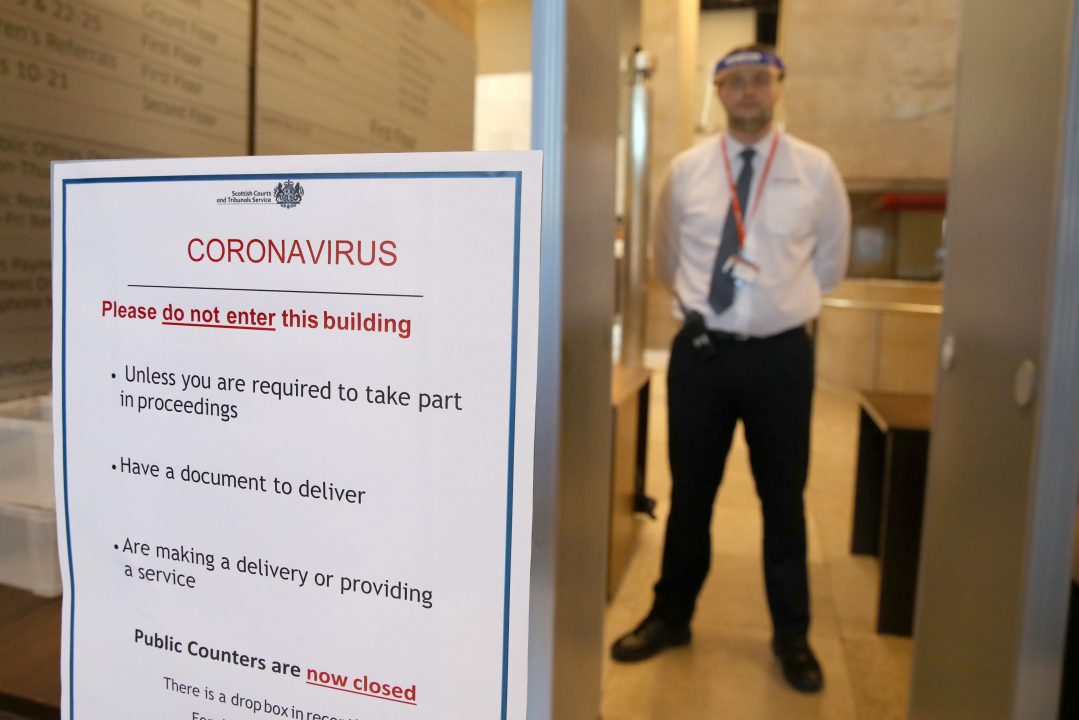Lawyers groups have backed early resolutions for less serious criminal cases to help clear a three-year trial backlog which has built up during the pandemic.
Sheriff Court summary criminal cases, where a sheriff hears a case sitting alone without a jury, widely resumed in Scotland on Monday after being largely suspended for more than three months.
Under summary trials the maximum jail term is 12 months and the biggest fine is £10,000.
David Fisken, the vice president of the Glasgow Bar Association, warned there was a theoretical danger of people accused of crimes pleading guilty because they could spend longer on remand than any custodial sentence they may receive.
 PA Wire
PA WireHe said: “If a client is adamant he wants to plead guilty and tells you he has done it, there is at least a danger they have done it to have a swifter resolution to it.
“There are real concerns over the mental health of the accused, victims and witnesses having these sorts of things hanging over them.
“There’s no doubt it’s a massive problem.”
As of April 9, 1801 people were being held in prisons awaiting trial, compared with an average of 1383 throughout 2019-20, Scottish Prison Service figures show.
Debbie Wilson, the convener of the Law Society of Scotland’s Criminal Law Committee, said more meetings between prosecutors and defence lawyers outside courtrooms could resolve cases early by agreement.
The move, called Pre-Intermediate Diet Meetings (PIDMS), would see only cases which are definitely ready for trial called on, reducing time-consuming last-minute adjournments and late guilty pleas, Judiciary of Scotland guidance states.
It would also prevent witnesses and complainers having to attend court unnecessarily, it adds.
Mr Fisken also called for more efficient use of court space, saying he had been told that Glasgow Sheriff Court had been using only about half of its capacity of 14 summary trials per day.
Ms Wilson said the widespread restarting of summary trials was an “important step forward” but the justice system needs more “creative, workable solutions” going forward.
She said in a statement: “The substantial backlog of trials has had a significant impact on both witnesses and the accused.
“A strength of the Scottish criminal justice system had been its respect for timescales, such as those for custody cases, however, the pandemic has adversely lengthened the time people are held on remand.
“The accused should not have pressure put on them to resolve their case. However, where the weight of evidence is against them, they should be given every opportunity to admit their guilt and allow the matter to be resolved quickly.”
Court guidance issued last November said PIDMs “will help to ensure that only those cases which cannot be resolved by agreement, and which are ready for trial, will advance to the trial date, thus reducing the unnecessary attendance at court of all involved in a case”.
The Lord President, Lord Carloway, said it would “improve the efficiency of the courts”, adding: “It is vital to the efficient operation of the courts that valuable trial diets are not lost by last-minute adjournments or late guilty pleas.”
The Scottish Courts and Tribunal Service (SCTS) last month announced plans for more court capacity to clear the pile-up.
It is predicted even with the extra resources, summary trial backlogs may not be cleared until 2024, while the logjam of trials at the High Court and in sheriff solemn cases – where a sheriff sits with a jury – may not be cleared until 2025.
From September, there will be four additional High Courts, two additional sheriff courts for solemn cases and up to 10 more sheriff courts for summary cases.
Justice of the Peace Courts, which hear minor cases and can impose punishments of up to 60 days in prison or fines up to £2500, are expected to restart all matters on June 7.
Follow STV News on WhatsApp
Scan the QR code on your mobile device for all the latest news from around the country


 PA Wire
PA Wire

























